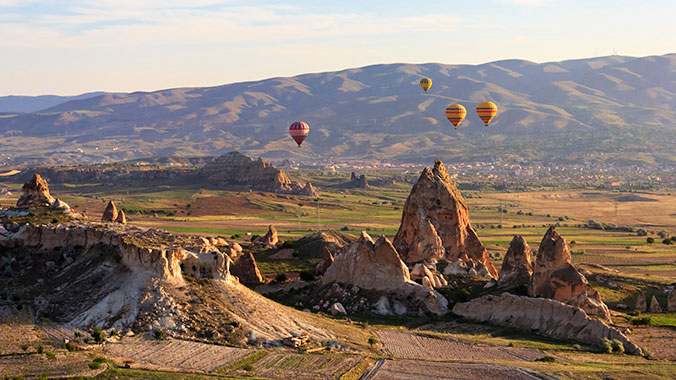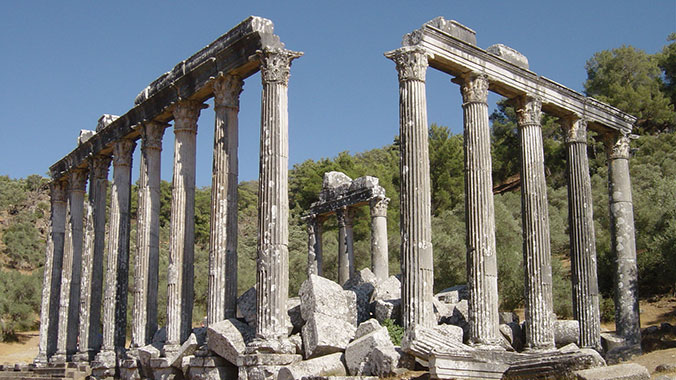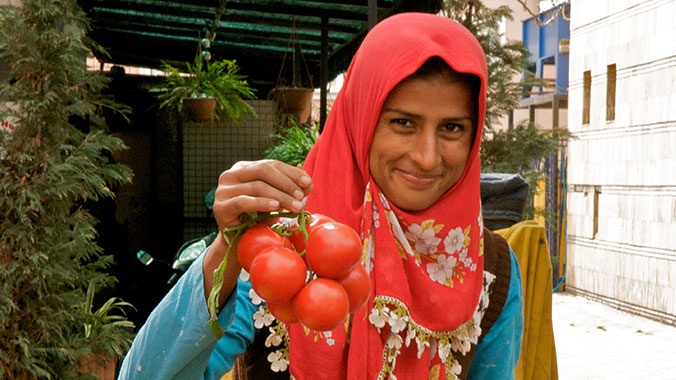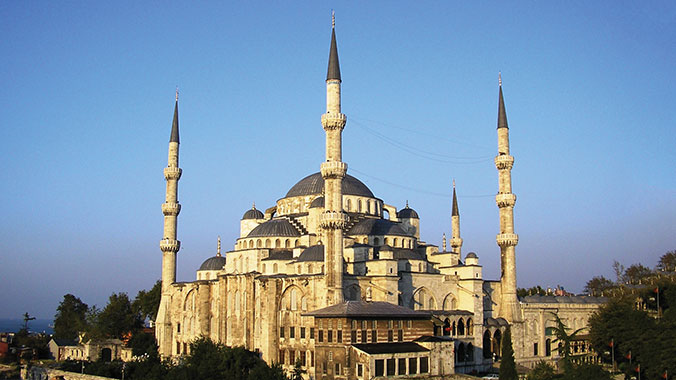Turkey
From Legends to History: Turkey's Legacy of Civilizations and Culture
Program No. 12828RJ
The story of Turkey is a blend of cultures and people as beautifully complex as the mosaics left by the Byzantine Empire. Join us and see for yourself what makes this country so unique.
Itinerary
While we make every effort to ensure the accuracy of our published materials, programs are typically advertised more than a year prior to their start date.
Read More.
While we make every effort to ensure the accuracy of our published materials, programs are typically advertised more than a year prior to their start date. As a result, some program activities, schedules, accommodations, personnel, and other logistics occasionally change due to local conditions or circumstances. Should a major change occur, we will make every effort to alert you. For less significant changes, we will update you during orientation. Thank you for your understanding.
Duration
17 days
16 nights
What's Included
43 meals (
15B, 14L, 14D
)
6 expert-led lectures
32 expert-led field trips
2 hands-on experiences
An experienced Group Leader
15 nights of accommodations
Taxes and customary gratuity
Road Scholar Assurance Plan
Day
1
In Transit to Program
Location:
In Flight
Day
2
Arrival, Registration & Welcome Meeting, Welcome Dinner
Location:
Ankara
Meals:
D
Stay:
Divan Hotel Ankara
Activity Note
Upon arrival in Ankara Airport, clear passport control, claim your bags, go through customs and the sliding doors and look for the Road Scholar sign.
Afternoon:
After checking in to the hotel and getting your room, take some time to freshen up and relax before our Orientation meeting. Orientation at 6 PM. In our meeting room at the hotel, the Group Leader will greet everyone and lead introductions. We will review the up-to-date program schedule, discuss roles and responsibilities, logistics, safety guidelines, emergency procedures, and answer questions. We will review COVID-19 protocols and will adhere to applicable requirements and guidelines throughout the program. The Group Leaders for our Road Scholar programs in Turkey serve as Study Leaders as well as managers of logistics. They are licensed and certified by the Ministry of Tourism for proficiency in Turkish history, culture, archeology, mythology, current affairs, and more. In addition to lectures and field trips, they will often give presentations on topics such as these during long transfers. Program-related travel and transfers will be via comfortable, air-conditioned Mercedes-Benz buses. Meals will generally offer foods representative of their regions. Depending on the accommodations, some will be multi-course plated meals while others will be buffets with numerous choices. Periods in the schedule designated as “Free time” and “At leisure” offer opportunities to do what you like and make your experience even more meaningful and memorable according to your personal preferences. The Group Leader will be happy to offer suggestions. The Group Leader will also give information about an optional hot air balloon flight in Cappadocia and will ask for interested participants to sign up for this activity. Program activities, schedules, personnel, and indicated distances or times may change due to local circumstances/current conditions. In the event of changes, we will alert you as quickly as possible. Thank you for your understanding.
Dinner:
At the hotel
Evening:
At leisure. Continue getting to know your fellow Road Scholars, settle in, and get a good night’s rest for the day ahead.
Day
3
Anatolian Civilizations Museum, Anitkabir Atatürk Mausoleum
Location:
Ankara
Meals:
B,L,D
Stay:
Divan Hotel Ankara
Activity Note
Getting on/off a bus; city driving, approximately 1 hour riding time. Walking up to 2 miles throughout the day; urban terrain.
Breakfast:
At the hotel.
Morning:
We will drive a short distance to the award-winning Museum of Anatolian Civilizations, located near the citadel of Ankara. There, we will have a lecture by an expert from Bilkent University in Ankara who will lead our exploration. We will learn about ancient civilizations that flourished in Anatolia and talk about the unique artifacts on display, providing a general overview about the civilizations of Turkey. The Museum exhibits boast artifacts from the Paleolithic era and continue chronologically through the Neolithic, Early Bronze, Assyrian trading colonies, Hittite, Phrygian, Urartian, Greek, Hellenistic, Roman, Byzantine, Seljuk and Ottoman periods. It is especially renowned for its artifacts from the Neolithic site of Catalhoyuk. The collection includes Mother Goddess sculptures, wall paintings, clay figurines, stamps, earthenware containers, and agricultural tools made from bones. The most impressive parts of this exhibit are a hunting scene on plaster from the 7th millennium BCE, a reproduction of a Çatalhoyuk room with wall-mounted bull heads, a Mother Goddess Kybele (later Cybele) sculpture, obsidian tools, wall paintings of the (now extinct) volcano Mount Hasan erupting, and wall paintings of a leopard.
Lunch:
At a restaurant in Ankara.
Afternoon:
Next, we will ride to Anitkabir, the Mausoleum of Mustafa Kemal Atatürk (1881-1938), who led the war for Turkish independence, the Turkish revolution, and founded the Turkish republic. An expert will lead our exploration as we get background on modern Turkey and a deeper understanding of this revolutionary character who shaped the nation. We will see in this complex that his legacy lives on and how he is deeply revered all over Turkey. After our field trip, we will ride back to the hotel.
Dinner:
At the hotel.
Evening:
We will gather with our Group Leader for a lecture and Q&A on modern Turkey and its contemporary issues. Prepare for check-out and transfer in the morning.
Day
4
Hattusas, Anatolian Steppes to Cappadocia
Location:
Cappadocia
Meals:
B,L,D
Stay:
Alden Hotel Cappadocia
Activity Note
Getting on/off a bus; driving about 250 miles throughout the day, approximately 6 hours total riding time. Walking up to 3 miles; occasionally uneven terrain at ancient sites.
Breakfast:
At the hotel.
Morning:
We will check out of the hotel, board our bus, and ride out of Ankara, heading east to Hattusas, a UNESCO-designated World Heritage Site. Once capital of the Hittite Kingdom, it flourished between 1800-1200 BCE and controlled most of the territories in Asia Minor and the Middle East. We will make several stops to see the amazing architecture of this capital city and learn about the Hittite religious pantheon, also called the Religion with 1,000 Gods.
Lunch:
At a restaurant in Hattusas.
Afternoon:
Reboarding the motorcoach, we will ride south, passing through the central plains of Turkey and agricultural lands to Cappadocia. Upon arrival we will check in to our newly built and award winning hotel with some time to freshen up and relax before dinner.
Dinner:
At the hotel.
Evening:
At leisure.
Day
5
Goreme Open Air Museum, Fantastic Formations of Cappadocia
Location:
Cappadocia
Meals:
B,L,D
Stay:
Alden Hotel Cappadocia
Activity Note
Walking up to 4 miles; uneven terrain. Sturdy walking shoes highly recommended. Some caves/churches require crouching to enter.
Breakfast:
At the hotel.
Morning:
This morning there wil be an elective hot air balloon flight over the lunar-like landscape of Cappadocia. Participants choosing to enjoy this optional activity will be picked up from the hotel before sunrise and return to the hotel for breakfast and in time for departure for the daily field trips. After breakfast, for our next field trip, we will ride to the Goreme Open Air Museum, a monastic center comprised of caves carved out of the soft volcanic rock of Cappadocia and decorated with frescoes and paintings. We will learn about the history of Christianity and monasticism in the area as well as the artistic and religious significance of frescos in these churches.
Lunch:
At a local restaurant
Afternoon:
We will visit the workshop of a local artisan who specializes in pottery making, using clay from the nearby Halys River. We’ll learn about this 5,000 year old craft and have an opportunity to try our hand on the potter’s wheel. We’ll then ride to attend a Whirling Dervish ceremony performed by local Sufis at a restored caravansaray — an ancient camel “motel” from the 13th century on the Silk Road.
Dinner:
At the hotel
Evening:
At leisure.
Day
6
Love Valley, Village of Sinasos
Location:
Cappadocia
Meals:
B,L,D
Stay:
Alden Hotel Cappadocia
Activity Note
Getting on/off a bus driving about 40 miles throughout the day, approximately 4 hours total riding time. Walking about 4 miles; uneven terrain. Elective hike through the formations of Cappadocia. Wear good walking shoes.
Breakfast:
At the hotel.
Morning:
We will ride to explore the village of Sinasos. This village had a largely Greek population in Ottoman times. Today, it is a thriving town with a small university training hot air balloon pilots, yet still seldom visited by travelers.
Lunch:
At a family home in the village of Ayvali. Lunch will be cooked by the mother and the grandmother of the family and served by the whole family.
Afternoon:
This afternoon will be dedicated to more exploration in the gorges and valleys of Cappadocia. We will visit the impressive underground city of Ozkonak, carved out of the ground to provide shelter from attacking armies. There will also be an opportunity for an elective hike with our Group Leader for photo stops at some significant vantage points to get an overview of this magical landscape.
Dinner:
At the hotel.
Evening:
At leisure.
Day
7
Silk Road, Sultanhani Caravanserai, Rumi Museum, Taurus Mts.
Location:
Antalya
Meals:
B,L,D
Stay:
Akra Barut Hotel
Activity Note
Getting on/off a bus; driving about 300 miles throughout the day, approximately 8 hours total riding time. Walking about 1 mile; generally even terrain.
Breakfast:
At the hotel.
Morning:
We will leave the hotel early and ride west to Konya on the central plateau of Turkey, following the ancient Silk Road. We will stop to explore Sultanhani, a 13th-century Seljuk caravanserai, another ancient camel “motel” built on the Silk Road to accommodate the caravans of trade. Sultanhani is the largest and best preserved of the existing caravanserais.
Lunch:
At a restaurant in Konya featuring local cuisine.
Afternoon:
Once in Konya, we will visit the Mevlâna Museum and Mausoleum of Mevlana Rumi, founder of the Whirling Dervish sect of Islam. We will learn about the mystic aspect of Sufism and hear some of Rumi’s beautiful poetry. Our group leader will discuss the principles of Sufism and enlighten us about their beliefs and rituals. We will also visit the workshop of a local felt master who specializes in making the special hats worn by the dervishes. This same master also will talk about Sufism and what it means to be a Sufi. We will then get back on our motorcoach and drive across the Taurus Mountains to arrive in Antalya on the Mediterranean Coast of Turkey.
Dinner:
At the hotel
Evening:
At leisure.
Day
8
Ancient City of Perge, Roman Theater of Aspendos, Free Time
Location:
Antalya
Meals:
B,L,D
Stay:
Akra Barut Hotel
Activity Note
Getting on/off a bus; driving about 190 miles throughout the day, approximately 4 hours total riding time. Walking up to 3 miles; occasional uneven pavement.
Breakfast:
At the hotel.
Morning:
We will depart in the morning to visit the Roman cities of Perge and Aspendos. Perge is one of the largest and most important cities on the Mediterranean coast with its impressive Hellenistic and Roman buildings. Aspendos boasts the best preserved ancient Roman theater in Turkey and this 2,000 year old theater is still in use for concerts and various performances.
Lunch:
At a restaurant near Aspendos.
Afternoon:
We will return to Antalya in the afternoon to enjoy some free time.
Dinner:
At the hotel.
Evening:
At leisure.
Day
9
Antalya Archeological Museum, Free Time
Location:
Antalya
Meals:
B,L,D
Stay:
Akra Barut Hotel
Activity Note
Walking about 2 miles and standing during the museum visit; old town streets steep towards harbor.
Breakfast:
At the hotel.
Morning:
We will set out on the bus for a field trip to the award-winning Antalya Archeological Museum, one of the largest archaeology museums in Turkey, featuring traces of ancient Lycia, Pamphylia, and Pisidia. An archeologist from the local Akdeniz University will give us a lecture and lead our exploration.
Lunch:
Lunch at a local restaurant in Antalya
Afternoon:
Free time. This period of time has been set aside for your personal independent exploration to see and do what interests you most. Please refer to the list of Free Time Opportunities. The Group Leader will be happy to offer suggestions. Please note that the period scheduled for free time is subject to change depending on local circumstances and opportunities for independent exploration. You might like to take a walk in the old city, take advantage of the hotel facilities, spend time with fellow Road Scholars, or just relax.
Dinner:
At the hotel.
Evening:
At leisure. Prepare for check-out and transfer in the morning.
Day
10
The Aphrodisias, the City of Aphrodite, Goddess of Love
Location:
Pamukkale
Meals:
B,L,D
Stay:
Doga Thermal Hotel
Activity Note
Getting on/off a bus; driving about 160 miles throughout the day, approximately 5 hours total riding time. Walking about 3 miles throughout the day; uneven terrain at the ancient site of Aphrodisias.
Breakfast:
At the hotel.
Morning:
After checking out of the hotel, we will ride north through lush countryside towards the ancient site of Aphrodisias.
Lunch:
At a local restaurant near the ancient site.
Afternoon:
We will visit the stunningly beautiful Aphrodisias, the splendid Greek Roman city dedicated to Aphrodite, the Greek goddess of love. As we explore, we will be amazed by the marble sculptures and statues once made in this city. The other highlight of this antique city is its ancient stadium. We then get back on our coach and drive to our hotel in Pamukkale.
Dinner:
At the hotel.
Evening:
At leisure.
Day
11
Hierapolis,Natural Calcium Pools of Pamukkale,Farmers Market
Location:
Kusadasi
Meals:
B,L,D
Stay:
La Vista Boutique Hotel
Activity Note
Getting on/off a bus; driving about 160 miles throughout the day, approximately 4 hours total riding time. Walking up to 2 miles; uneven terrain. Use extreme caution walking on slippery cascades and travertines of Pamukkale. Shoes will need to be taken off before stepping on the cascades.
Breakfast:
At the hotel.
Morning:
Following an early breakfast, we will set out on a walking field trip to explore the ancient city of Hierapolis, a UNESCO-designated World Heritage Site. We will also see and learn about its hot springs, natural calcium pools, travertines, and terraces of carbonate minerals left by the flowing water. The hot springs were used as a spa from the 2nd century BCE. We then get back on our coach and ride along the Meander Valley amidst orchards and cotton fields to arrive in Selcuk.
Lunch:
At a restaurant near the ruins.
Afternoon:
After lunch, we will stop at the colorful Selcuk Farmers Market held every week on Saturdays. We will proceed to Kusadasi and check in to our hotel, located right on the Aegean Sea.
Dinner:
At the hotel.
Evening:
At leisure.
Day
12
Ephesus, Archaeological Museum
Location:
Kusadasi
Meals:
B,L,D
Stay:
La Vista Boutique Hotel
Activity Note
Walking up to 4 miles; occasionally uneven terrain in 2,000-year-old ancient city; climbing several sets of steep stairs at Terrace Houses of Ephesus.
Breakfast:
At the hotel.
Morning:
We will board the bus with our Group Leader and ride to the ancient city of Ephesus. We’ll then set out on a walking field trip to explore the mesmerizing site. We will gain in-depth knowledge of this unforgettable ancient city that one had a population of 250,000. We will also visit the Terrace Houses, a museum within the ancient site where the rich and famous of Ephesus once lived.
Lunch:
At a local restaurant.
Afternoon:
Next, we will explore the Museum of Ephesus that houses stunning artifacts excavated here. We’ll then stop at the ruins of the Temple of Artemis — one of the Ancient Seven Wonders of the World — and learn about its fascinating story. Those who wish to return to the hotel can reboard the bus. There will be an elective opportunity to visit a local handcrafts center to learn about Turkish carpets. Those who would like to do so can try a hand at rug weaving.
Dinner:
At the hotel.
Evening:
At leisure. Prepare for check-out and transfer in the morning.
Day
13
Troy
Location:
Canakkale
Meals:
B,L,D
Stay:
DoubleTree Canakkale
Activity Note
Getting on/off a bus; driving about 260 miles throughout the day, approximately 7 hours total riding time. Walking up to 2 miles; uneven terrain.
Breakfast:
At the hotel.
Morning:
After checking out of the hotel early, we will ride north along the Aegean Sea and pass through Izmir — ancient Smyrna — the third largest city of Turkey, known as the Pearl of the Aegean.
Lunch:
At a seafood restaurant in a small town on the Aegean Sea.
Afternoon:
We will continue riding through the northern regions of the Aegean Sea and see plenty of olive groves during the ride. In late afternoon, we will stop at Hisarlik, the site of legendary Troy immortalized by Homer, and learn about the myth and the facts behind its 4,000 year history. We will also explore the recently opened Museum of Troy, located near the site. We will check in to our hotel before dinner.
Dinner:
At the hotel.
Evening:
At leisure.
Day
14
Gallipoli National Park, Anzac Cove
Location:
Istanbul
Meals:
B,L,D
Stay:
Armada Hotel Istanbul
Activity Note
Getting on/off a bus; driving about 210 miles throughout the day, approximately 6 hours total riding time. Getting on/off a ferry. Walking about 2 miles; generally even terrain.
Breakfast:
At the hotel.
Morning:
We will check out early, ride from Canakkale, and take the ferry across the Dardanelles from Asia to Europe. We will visit Gallipoli National Park and see the Anzac Cove to recall the tragic campaign launched by the Allied Forces in World War I. The Gallipoli campaign played a very important role in the recent histories of Australia, New Zealand, and Turkey.
Lunch:
At a restaurant en route featuring “kofte” (Turkish meatballs).
Afternoon:
We will continue our journey to Istanbul and arrive mid-afternoon for hotel check-in. We will gather for a lecture by a professor from the Istanbul Technical University History of Architecture Department and learn about urban development of Istanbul through an architectural perspective.
Dinner:
At the hotel.
Evening:
At leisure.
Day
15
Topkapi Palace, The Harem, Underground Cisterns.
Location:
Istanbul
Meals:
B,L
Stay:
Armada Hotel Istanbul
Activity Note
Walking up to 5 miles throughout the day; some cobblestone streets and steep streets. Good walking shoes recommended.
Breakfast:
At the hotel
Morning:
We will spend the day exploring on foot due to traffic restrictions in the old city. For our first walking field trip, we’ll set out for Topkapi Palace, the seat of the Ottoman Sultans for 400 years and a testimony to the power and wealth of the Ottoman Empire. We will also have a privileged visit to the Harem and catch a glimpse of what daily life was like behind these closed doors 400 years ago.
Lunch:
At a restaurant in Sultanahmet featuring Ottoman cuisine.
Afternoon:
Next, we will walk to the Spice Bazaar — in Turkish, the “Egyptian” bazaar — constructed in 1663 and second in fame only to the Grand Bazaar. The scents and aromas will enliven our senses immediately. We will then explore the Underground Cisterns, built in 532 CE by the Byzantine Emperor Justinian to store water for his city.
Dinner:
On your own to enjoy the cuisine of your choice. The Group Leader will be happy to offer suggestions.
Evening:
At leisure.
Day
16
Hagia Sophia, Blue Mosque, Bosphorus Cruise, Grand Bazaar
Location:
Istanbul
Meals:
B,L,D
Stay:
Armada Hotel Istanbul
Activity Note
Getting on/off a bus; city driving, approximately 1 hour riding time. Getting on/off a private boat; riding approximately 2 hours. Walking up to 2 miles throughout the day; generally even terrain. Expect crowded conditions in bazaars and other popular sites.
Breakfast:
At the hotel.
Morning:
We will walk to the extraordinary Hagia Sophia, once the greatest church in Byzantium — built in 537 CE — and a great mosque after the Ottoman conquest of Constantinople in 1453. We will learn about the unique architecture as we stand in awe at its size and dazzling beauty. We will then board a bus and ride along what were the ancient city walls of Constantinople and learn about their strength and history. Moving on, we’ll explore the small but gem-like mosque of Rustem Pasha that will display the stunning masterpieces of Iznik tiles from 16th century.
Lunch:
At a kebab restaurant near the Spice Bazaar.
Afternoon:
For our next field trip, we will walk to the Blue Mosque, inaugurated in 1617 and world-renowned for its Iznik tile decorations. We’ll then board a privately chartered boat and embark on a study cruise on the wonderful Bosphorus and see its lovely waterfront houses and palace. We’ll hear expert commentary as we go. We will end the day at the Grand Bazaar, a maze of 4,000 shops and alleys. We will also have some time for independent exploration.
Dinner:
At the hotel on a terrace with commanding views of the old city and the Sea of Marmara. Share favorite experiences with new Road Scholar friends during our farewell dinner.
Evening:
At leisure. Prepare for check-out and departure in the morning.
Day
17
Program Concludes, In Transit From Program
Location:
In Flight
Meals:
B
Activity Note
Hotel check-out 12:00 Noon. See your program’s “Getting There” information regarding transfers.
Breakfast:
At the hotel.
Morning:
There will be group transfers from the hotel to Istanbul Airport, depending on the departure times of flights. This concludes our program. If you are returning home, safe travels. If you are staying on independently, have a wonderful time. If you are transferring to another Road Scholar program, detailed instructions are included in your Information Packet for that program. We hope you enjoy Road Scholar learning adventures and look forward to having you on rewarding programs in the future. Don’t forget to join our Facebook page and follow us on Instagram. Best wishes for all your journeys!
Please select a day to update the map
Map details are not available for this location.




